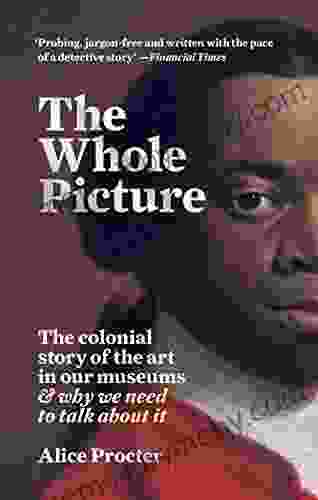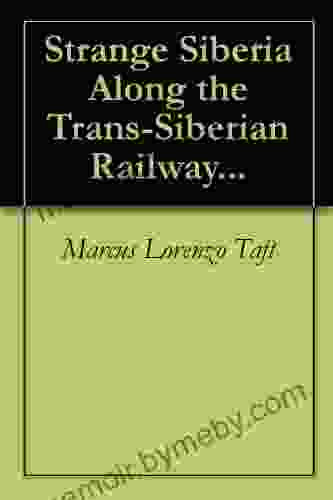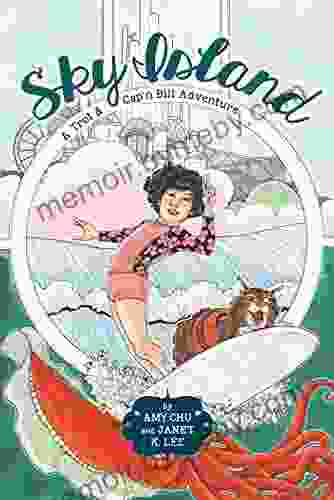The Colonial Story of the Art in Our Museums: Why We Need to Talk About It

Museums, revered as sanctuaries of cultural heritage, house a treasure trove of art that captivates our imaginations and transports us through time. However, beneath the alluring façade of these institutions lies a complex and often overlooked narrative—the colonial story of the art within their walls.
4.4 out of 5
| Language | : | English |
| File size | : | 8601 KB |
| Text-to-Speech | : | Enabled |
| Screen Reader | : | Supported |
| Enhanced typesetting | : | Enabled |
| Word Wise | : | Enabled |
| Print length | : | 246 pages |
For centuries, museums have been shaped by the colonial powers that established and controlled them. The acquisition of art from colonized territories was often driven by a desire to assert dominance and display the supposed superiority of European culture. This process of collecting and displaying art was not simply a neutral act of preservation; it was an act of power and control.
The Colonial Gaze
The colonial gaze, a perspective shaped by the power dynamics of colonialism, has profoundly influenced the way that art from colonized cultures is presented and interpreted in museums. This gaze often exoticizes and decontextualizes non-Western art, reducing it to mere curiosities or objects of aesthetic appreciation.
Historically, museums have tended to focus on the artistic achievements of dominant cultures while marginalizing the art of colonized peoples. This has resulted in a skewed representation of global art history, perpetuating narratives that privilege certain cultures and perspectives over others.
Hidden Histories and Silenced Voices
The colonial story of art in museums goes beyond the mere physical presence of objects. It also encompasses the hidden histories and silenced voices of the people whose cultures have been appropriated and marginalized. Indigenous perspectives, for example, have often been ignored or misrepresented in museum collections and exhibitions.
By failing to acknowledge the colonial context in which art was acquired and displayed, museums perpetuate a sanitized and incomplete history. This omission erases the experiences and struggles of the people who created these works, obscuring the true complexities of their cultural heritage.
The Need for Dialogue and Inclusivity
In the wake of growing awareness about the colonial legacy of museums, there is an urgent need for dialogue and inclusivity. Museums must take an active role in acknowledging and addressing the colonial biases that have shaped their collections and practices.
This process involves engaging with diverse communities, listening to their perspectives, and working collaboratively to develop more inclusive and representative exhibitions and educational programs. By fostering a dialogue about the colonial past, museums can create a more equitable and just space for the appreciation and understanding of global art.
Decolonizing the Museum
Decolonizing the museum is an ongoing process that requires museums to critically examine their collections, practices, and narratives. This can involve:
* Repatriating objects that were acquired through unethical means * Reinterpreting collections through a decolonial lens * Collaborating with communities from which the art originated * Diversifying museum leadership and staff to reflect the diversity of the communities they serve
By embracing a decolonial approach, museums can move beyond their colonial past and become more inclusive and equitable institutions that truly represent the diversity of human creativity.
Educational Imperative
Museums have a vital educational role to play in shaping how the public understands the colonial story of art. By incorporating the colonial context into their educational programs, museums can help visitors:
* Understand the complex power dynamics that have shaped museum collections * Critically engage with the narratives presented in museums * Develop a more nuanced understanding of global art history * Recognize the importance of diversity and inclusivity in museum representation
Through educational initiatives, museums can empower visitors to be more informed and critical consumers of cultural heritage, challenging colonial legacies and fostering a more just and equitable future.
The colonial story of the art in our museums is a complex and challenging one. It requires us to confront the legacies of colonialism and the ways in which they have shaped our understanding of art and culture. By acknowledging and addressing these biases, museums can become more inclusive and representative institutions that truly celebrate the diversity of human creativity.
Unveiling the colonial story of art is not about erasing the past but about understanding it more fully. It is about giving voice to silenced histories and creating a more equitable and inclusive space for the appreciation and understanding of global art.
As we move forward, it is essential that museums embrace the principles of dialogue, inclusivity, and decolonization. By working together, we can create museums that are truly representative of the diverse world we live in and that inspire future generations to embrace a more just and equitable future.
4.4 out of 5
| Language | : | English |
| File size | : | 8601 KB |
| Text-to-Speech | : | Enabled |
| Screen Reader | : | Supported |
| Enhanced typesetting | : | Enabled |
| Word Wise | : | Enabled |
| Print length | : | 246 pages |
Do you want to contribute by writing guest posts on this blog?
Please contact us and send us a resume of previous articles that you have written.
 Book
Book Novel
Novel Page
Page Chapter
Chapter Text
Text Story
Story Genre
Genre Reader
Reader Library
Library Paperback
Paperback E-book
E-book Magazine
Magazine Newspaper
Newspaper Paragraph
Paragraph Sentence
Sentence Bookmark
Bookmark Shelf
Shelf Glossary
Glossary Bibliography
Bibliography Foreword
Foreword Preface
Preface Synopsis
Synopsis Annotation
Annotation Footnote
Footnote Manuscript
Manuscript Scroll
Scroll Codex
Codex Tome
Tome Bestseller
Bestseller Classics
Classics Library card
Library card Narrative
Narrative Biography
Biography Autobiography
Autobiography Memoir
Memoir Reference
Reference Encyclopedia
Encyclopedia Amy Boyles
Amy Boyles Alida Miranda Wolff
Alida Miranda Wolff Michael Skidgell
Michael Skidgell Alfred Lambremont Webre
Alfred Lambremont Webre Alvaro Castagnet
Alvaro Castagnet Alexander Rose
Alexander Rose Alexander Greenmaj
Alexander Greenmaj Arthur Gelb
Arthur Gelb Alexander Kugushev
Alexander Kugushev Milo S Afong
Milo S Afong Alice Pung
Alice Pung Alexandra Ott
Alexandra Ott David Stark
David Stark Alexander Bercovich
Alexander Bercovich Alida Nugent
Alida Nugent American Psychological Association
American Psychological Association Clive Glaser
Clive Glaser Elaine Russell
Elaine Russell Sam Pathy
Sam Pathy Penny Marshall
Penny Marshall
Light bulbAdvertise smarter! Our strategic ad space ensures maximum exposure. Reserve your spot today!

 Reginald CoxTurning Around One of Britain's Toughest Schools: A Journey of Transformation
Reginald CoxTurning Around One of Britain's Toughest Schools: A Journey of Transformation
 DeShawn PowellBeginner Manual And Hints Best Guns Gadgets Charms: The Ultimate Guide to...
DeShawn PowellBeginner Manual And Hints Best Guns Gadgets Charms: The Ultimate Guide to... Colin RichardsonFollow ·14k
Colin RichardsonFollow ·14k Johnny TurnerFollow ·5.4k
Johnny TurnerFollow ·5.4k Lucas ReedFollow ·14.2k
Lucas ReedFollow ·14.2k Tennessee WilliamsFollow ·5.4k
Tennessee WilliamsFollow ·5.4k Neal WardFollow ·9.4k
Neal WardFollow ·9.4k Denzel HayesFollow ·19.3k
Denzel HayesFollow ·19.3k Dan BellFollow ·16.6k
Dan BellFollow ·16.6k Aubrey BlairFollow ·4.7k
Aubrey BlairFollow ·4.7k

 Robert Reed
Robert ReedConservation Habitat Changes And The Rise Of Urban...
As urban areas continue to expand, wildlife...

 W. Somerset Maugham
W. Somerset MaughamRide the Waves: The Ultimate Guide to Surfing Indonesia...
Are you ready to embark on an unforgettable...

 Arthur Conan Doyle
Arthur Conan DoyleThe Widow, the Priest, and the Octopus Hunter: A Literary...
Prologue: A Tapestry...

 Fernando Bell
Fernando BellRide the Waves of Adventure: The Ultimate Guide to...
Unveiling the Surfing Paradise of Peru For...
4.4 out of 5
| Language | : | English |
| File size | : | 8601 KB |
| Text-to-Speech | : | Enabled |
| Screen Reader | : | Supported |
| Enhanced typesetting | : | Enabled |
| Word Wise | : | Enabled |
| Print length | : | 246 pages |












